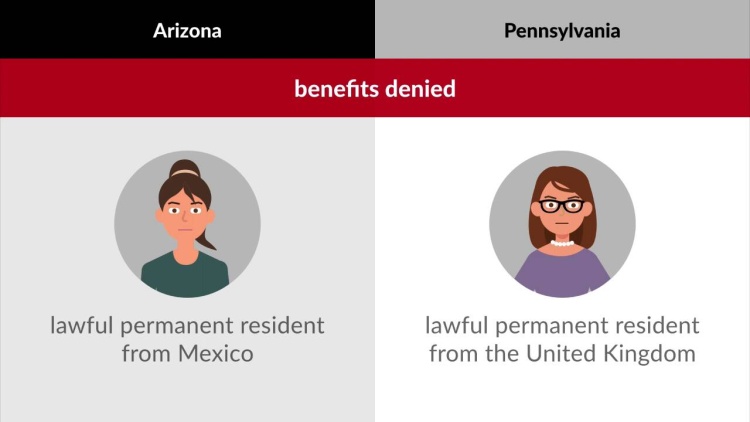Graham v. Richardson
United States Supreme Court
403 U.S. 365, 91 S. Ct. 1848, 29 L. Ed. 2d 534 (1971)
- Written by Megan Petersen, JD
Facts
Arizona participated in an assistance program funded in part by federal grants and administered by Arizona under federal guidelines. In addition to the federal requirements, Arizona required that program beneficiaries be United States citizens or have resided in the United States for at least 15 years. Similarly, Pennsylvania funded its own welfare program, but only United States citizens were permitted to receive benefits. Carmen Richardson (plaintiff) was a lawfully admitted resident alien in Arizona who was denied program benefits solely because she did not meet Arizona’s residency requirement. Elsie Leger (plaintiff) was a lawfully admitted resident alien in Pennsylvania who was denied assistance due to her lack of citizenship. Richardson and Leger brought separate class-action suits against Graham (defendant), the commissioner of the Arizona Department of Public Welfare, and the executive director of the Philadelphia County Board of Assistance and the secretary of the Commonwealth’s Department of Public Welfare (defendants), respectively. Richardson and Leger argued that the residency and citizenship requirements violated the Equal Protection Clause of the Fourteenth Amendment. The Arizona district court granted Richardson summary judgment on equal-protection grounds, and Graham appealed. Leger was granted a temporary restraining order and began receiving assistance, and the defendants appealed. The cases were consolidated before the United States Supreme Court.
Rule of Law
Issue
Holding and Reasoning (Blackmun, J.)
What to do next…
Here's why 904,000 law students have relied on our case briefs:
- Written by law professors and practitioners, not other law students. 47,100 briefs, keyed to 995 casebooks. Top-notch customer support.
- The right amount of information, includes the facts, issues, rule of law, holding and reasoning, and any concurrences and dissents.
- Access in your classes, works on your mobile and tablet. Massive library of related video lessons and high quality multiple-choice questions.
- Easy to use, uniform format for every case brief. Written in plain English, not in legalese. Our briefs summarize and simplify; they don’t just repeat the court’s language.





